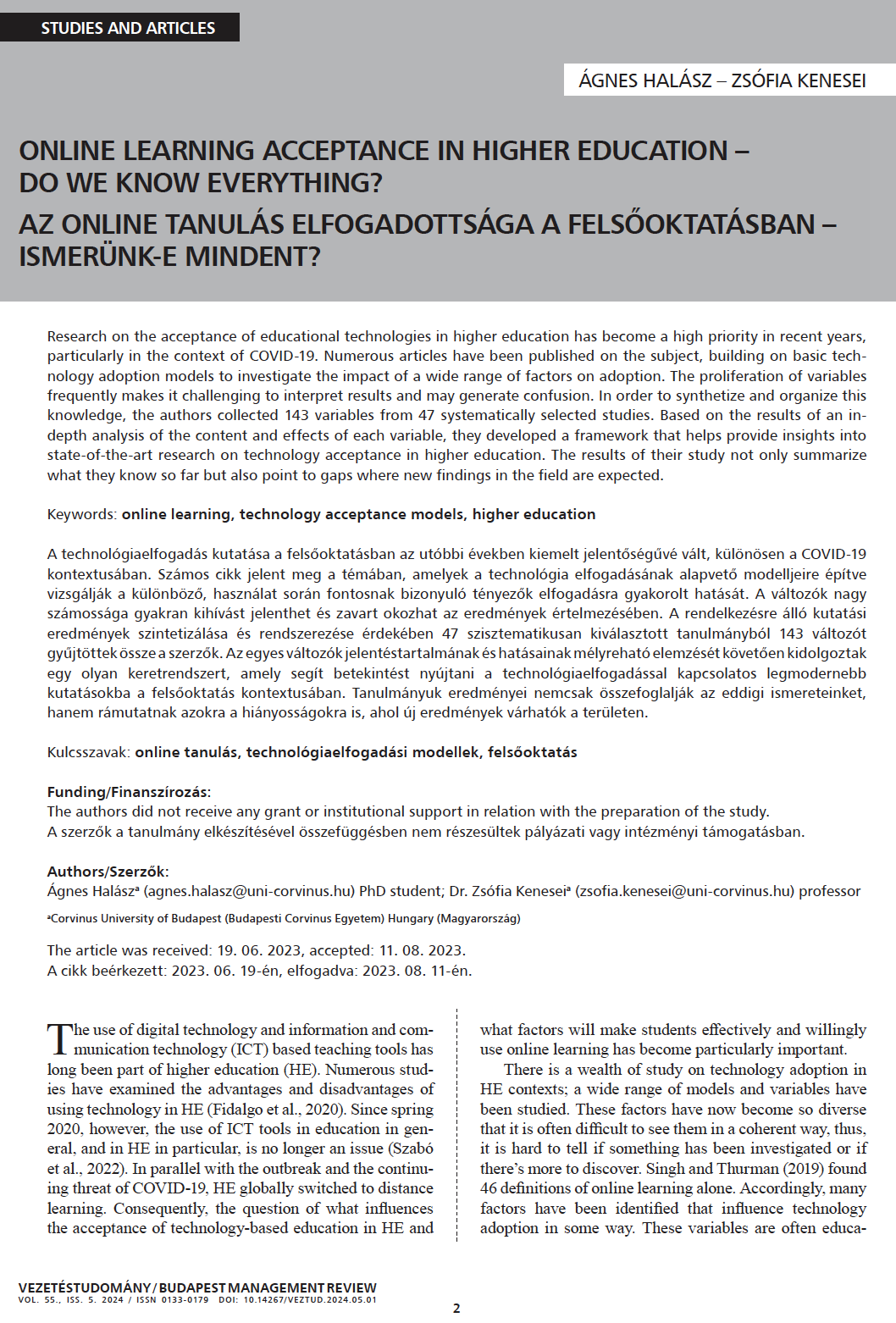Az online tanulás elfogadottsága a felsőoktatásban
Ismerünk-e mindent?
DOI:
https://doi.org/10.14267/VEZTUD.2024.05.01Kulcsszavak:
online tanulás, technológiaelfogadási modellek, felsőoktatásAbsztrakt
A technológiaelfogadás kutatása a felsőoktatásban az utóbbi években kiemelt jelentőségűvé vált, különösen a COVID-19 kontextusában. Számos cikk jelent meg a témában, amelyek a technológia elfogadásának alapvető modelljeire építve vizsgálják a különböző, használat során fontosnak bizonyuló tényezők elfogadásra gyakorolt hatását. A változók nagy számossága gyakran kihívást jelenthet és zavart okozhat az eredmények értelmezésében. A rendelkezésre álló kutatási eredmények szintetizálása és rendszerezése érdekében 47 szisztematikusan kiválasztott tanulmányból 143 változót gyűjtöttek össze a szerzők. Az egyes változók jelentéstartalmának és hatásainak mélyreható elemzését követően kidolgoztak egy olyan keretrendszert, amely segít betekintést nyújtani a technológiaelfogadással kapcsolatos legmodernebb kutatásokba a felsőoktatás kontextusában. Tanulmányuk eredményei nemcsak összefoglalják az eddigi ismereteinket, hanem rámutatnak azokra a hiányosságokra is, ahol új eredmények várhatók a területen.
Letöltések
Hivatkozások
Abdullah, F., & Ward, R. (2016). Developing a general extended Technology Acceptance Model for e-learning (GETAMEL) by analysing commonly used external factors. Computers in Human Behavior, 56, 238-256. https://doi.org/10.1016/j.chb.2015.11.036
Batra R. & Ahtola O.T. (1990). Measuring the hedonic and utilitarian sources of consumer attitudes. Marketing Letters, 2(2), 159–70. https://doi.org/10.1007/BF00436035
Granić, A. & Marangunić, N. (2019). Technology acceptance model in educational context: A systematic literature review. British Journal of Educational Technology, 50(5), 2572–2593. https://doi.org/10.1111/bjet.12864
Kaushik, M.K. & Verma, D. (2020). Determinants of digital learning acceptance behavior: A systematic review of applied theories and implications for higher education. Journal of Applied Research in Higher Education, 12(4), 659-672. https://doi.org/10.1108/JARHE-06-2018-0105
Keszey, T., & Zsukk, J. (2017). Az új technológiák fogyasztói elfogadása. A magyar és nemzetközi szakirodalom áttekintése és kritikai értékelése. Vezetéstudomány – Budapest Management Review, 48(10), 38-47. https://doi.org/10.14267/VEZTUD.2017.10.05
Keszey, T. (2020). Behavioural intention to use autonomous vehicles: Systematic review and empirical extension. Transportation Research Part C: Emerging Technologies, 119, 102732. https://doi.org/10.1016/j.trc.2020.102732
Martin, F. & Bolliger, D.U. (2022). Developing an online learner satisfaction framework in higher education through a systematic review of research. International Journal of Educational Technology in Higher Education 19 (50), 1-21. https://doi.org/10.1186/s41239-022-00355-5
Martin, F., Sun, T., & Westine, C.D. (2020). A systematic review of research on online teaching and learning from 2009 to 2018. Computers & Education, 159, 104009. https://doi.org/10.1016/j.compedu.2020.104009
Moher, D., Liberati, A., Tetzlaff, J., Altman, D.G., & PRISMA Group*. (2009). Preferred reporting items for systematic reviews and meta-analyses: the PRISMA statement. Annals of Internal Medicine, 151(4), 264-269. https://doi.org/10.7326/0003-4819-151-4-200908180-00135
Ryan, R.M. & Deci, E.L. (2009). Promoting self-determined school engagement: Motivation, learning, and well-being. In K.R. Wenzel & A. Wigfield (Eds), Handbook of Motivation at School (pp. 171–195). Routledge/Taylor & Francis Group.
Paul, J. & Criado, A.R. (2020). The art of writing literature review: What do we know and what do we need to know? International Business Review, 29(4), 101717. https://doi.org/10.1016/j.ibusrev.2020.101717
Siegrist, M. (2021). Trust and risk perception: A critical review of the literature. Risk Analysis, 41(3), 480-490. https://doi.org/10.1111/risa.13325
Singh, V. & Thurman, A. (2019). How many ways can we define online learning? A systematic literature review of definitions of online learning (1988-2018). American Journal of Distance Education, 33(4), 289–306. https://doi.org/10.1080/08923647.2019.1663082
Szabó, K., Juhász, T., & Kenderfi, M. (2022). Felsőoktatás a COVID-19 árnyékában: Hazai tapasztalatok oktatói oldalról. Vezetéstudomány – Budapest Management Review, 53(6), 2-12. https://doi.org/10.14267/VEZTUD.2022.06.01

Downloads
Megjelent
Hogyan kell idézni
Folyóirat szám
Rovat
License
Copyright (c) 2024 Vezetéstudomány / Budapest Management Review

This work is licensed under a Creative Commons Attribution 4.0 International License.
Authors assign copyright to Vezetéstudomány / Budapest Management Review. Authors are responsible for permission to reproduce copyright material from other sources.

